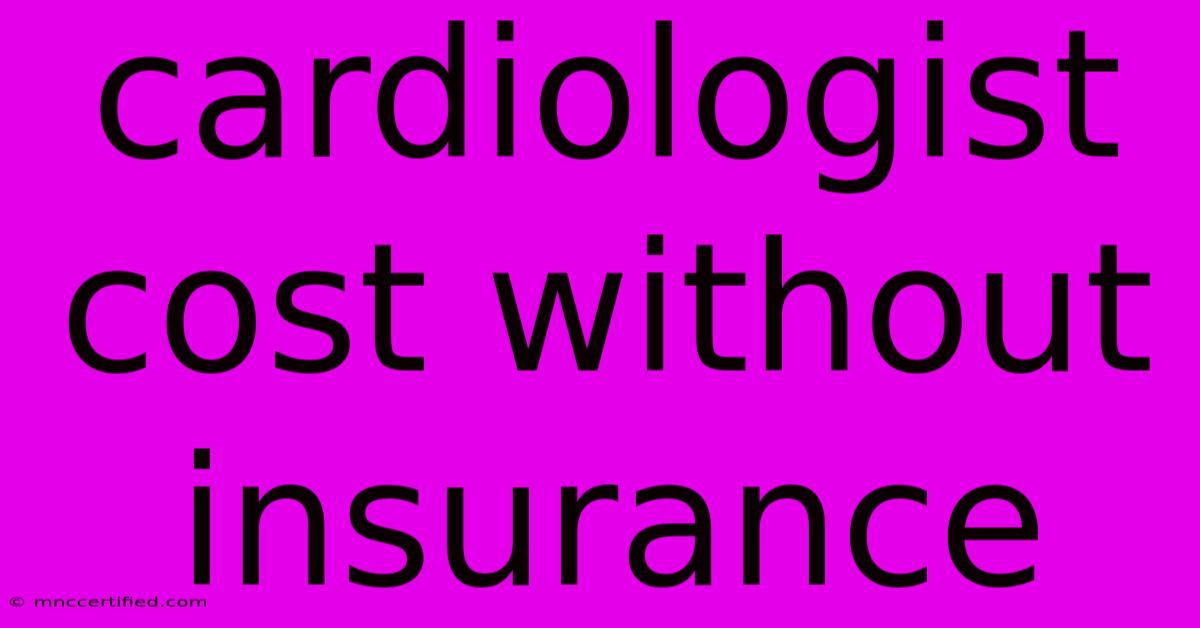Cardiologist Cost Without Insurance

Table of Contents
The Cost of a Cardiologist Visit Without Insurance: A Comprehensive Guide
Heart health is crucial, and seeing a cardiologist is essential for anyone experiencing concerning symptoms or needing preventative care. But what happens when you don't have insurance? The cost of a cardiologist visit without insurance can be daunting, and understanding the factors that influence pricing is vital. This guide provides a comprehensive overview of the costs involved, helping you make informed decisions about your healthcare.
Understanding the Factors Affecting Cost
The price of a cardiologist visit without insurance varies widely, influenced by:
- Location: Costs are higher in metropolitan areas compared to rural locations.
- Type of visit: Initial consultations, follow-up appointments, and specialized procedures carry different fees.
- Cardiologist experience: More experienced or renowned cardiologists may charge higher fees.
- Length of visit: Longer appointments typically incur higher charges.
- Tests and procedures: Diagnostic tests, like an EKG or echocardiogram, add to the total cost.
Typical Costs of a Cardiologist Visit
Here's a breakdown of estimated costs for various cardiologist services without insurance:
- Initial consultation: $200-$400
- Follow-up appointment: $150-$300
- EKG: $50-$150
- Echocardiogram: $100-$300
- Stress test: $200-$400
- Holter monitor: $200-$400
- Cardiac catheterization: $5,000-$10,000 (estimated)
Note: These costs are estimates and may vary significantly depending on the factors mentioned earlier.
Finding Affordable Options
While visiting a cardiologist without insurance can be expensive, several strategies can help you manage costs:
- Negotiate payment plans: Ask the cardiologist's office about payment plan options or discounts for cash payments.
- Consider discounted clinics: Explore community health centers or clinics offering sliding scale fees based on income.
- Check for financial assistance programs: Some non-profit organizations or healthcare providers offer financial aid for uninsured patients.
- Shop around for prices: Call several cardiologists in your area to compare consultation fees and test prices.
- Explore telehealth options: Telemedicine platforms can offer virtual consultations with cardiologists, often at lower costs.
The Importance of Preventive Care
Even without insurance, preventive care is crucial for maintaining heart health. Engaging in healthy lifestyle habits, like regular exercise, a balanced diet, and avoiding smoking, can significantly reduce the risk of heart disease.
Remember: While the cost of a cardiologist visit without insurance can be a significant financial burden, prioritizing your heart health is paramount. By researching available options, negotiating fees, and exploring alternative healthcare strategies, you can access the care you need without breaking the bank.

Thank you for visiting our website wich cover about Cardiologist Cost Without Insurance. We hope the information provided has been useful to you. Feel free to contact us if you have any questions or need further assistance. See you next time and dont miss to bookmark.
Featured Posts
-
Are Rv Awnings Covered By Insurance
Nov 13, 2024
-
Prue On Aging More Reckless Bella Magazine
Nov 13, 2024
-
Autumn Getaway Budget Friendly City Near Uk
Nov 13, 2024
-
Turkey Hotel British Mum Reports Nighttime Intruder
Nov 13, 2024
-
Costco Butter Recall Over Obvious But Issue
Nov 13, 2024